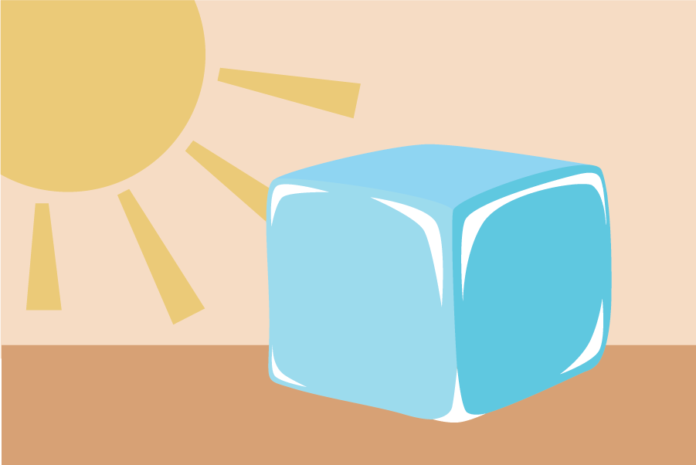UC Davis researchers create a non-melting, non-molding ice cube
Published on by Water Network Research, Official research team of The Water Network in Technology
Graphic by Katherine Franks / The Aggie
This sustainable ‘jelly’ ice-cube is reusable, compostable and recyclable
By MONICA MANMADKAR — science@theaggie.org
UC Davis researchers have developed a new sustainable ice cube that does not melt or grow mold. This new type of cooling cube can transform the way food is shipped and kept cool.
According to a UC Davis article, the idea sprouted from seeing the amount of ice used to keep seafood cool and fresh. When the ice melts, the water can be a carrier of microbial bacteria and cause contamination through runoff or other products. Plastic-free, compostable ice cubes help reduce cross-contamination and are anti-microbial.
“Dr. Luxin Wong, an associate professor in the Department of Food Science and Technology, noticed the issue of cooling seafood and potential contamination,” Dr. Gang Sun, a professor in the Department of Agricultural and Biological Engineering and the co-principal investigator of the project, said.
Additionally, Sun noted the amount of mold that grows in the ice packs students take in their lunchboxes to school. Wrapped in plastic, the coolants in these ice packs are non-biodegradable and non-compostable.
These new cubes are 90% water with the rest filled with stabilizing components. They can be used for 13 hours at a time and then can be re-frozen for their next use. Soft to touch and malleable, the cubes can be fitted for any use.
“In addition to being sustainable, the reusable cubes can be cut to any shape or size that is needed,” Jiahan Zou, a Ph.D. graduate student in the Department of Agricultural and Biological Engineering, said. “We hope that this will reduce the waste and make them more versatile.”
Zou has been working on this project for the past two years. The team of researchers designed them for repeated use. The cubes can be used several times before they need to be disposed of, and promote plant growth when composted in soil.
“We can simply clean them with some regular water to clean the surface dirt,” Zou said. “And once we drain the water, they can go back to the freezer, and they will be ready for the next time of use.”
The researchers filed a patent in July for the design and concept. This new technology is a better alternative to the regular ice cube, which could possibly reduce water consumption and offer a stabler coolant to companies.
For the future, the researchers hope to use recycled agricultural waste or byproducts as coolant material instead, hence making it even more environmentally friendly. They would also like to license it to other companies.
“We are positive that more and more stuff can be found by the future and would love to make it more environmentally friendly,” Zou said.
These new cubes are just the first wave of advancements that this team foresees in this project.
Written by: Monica Manmadkar — science@theaggie.org
Taxonomy
- Packaging
- Packaging
